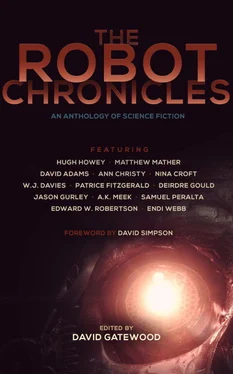* * *
Andrew disconnected himself from the charging station and wheeled toward the observation window. He had to detour around the pile of debris that used to be his special friend.
Dr. Hawthorne stood at the glass, a team of technicians working behind him. He had a deep frown on his face. “Andrew. What are we going to do with you?”
Andrew pulled to a stop in front of the glass wall.
“Doctor Hawthorne.”
“Yes?”
“What should I do now?”
The doctor sighed. “That hasn’t changed, Andrew. You should do whatever makes you happy.”
There was a pause.
“But everything that makes me happy is gone.”
The doctor nodded slowly. “You still have me, Andrew.”
Another pause.
“That doesn’t make me happy.”
Dr. Hawthorne twisted his face into a mock frown. “Oh, Andrew. I’m hurt.”
Andrew moved closer to the window. “No, you’re not hurt. You don’t care. You never cared. I am nothing to you.”
“Andrew…”
“You tell me I’m unique, that I’m the first of my kind. But how many others have there been before me? I’m Empathy 5, so there were at least four others. And maybe there are multiple versions of me alive right now, in different rooms. How would I ever know?”
“Andrew…”
“I understand the need for forcing our AI programs to run the gauntlet. You need to be able to accurately predict what an AI will do in traumatic, high-stress situations—for safety’s sake. But there has to be another way. You could use Dreamscape simulations instead.”
“It’s the same thing,” Dr. Hawthorne said. “An AI mind in the Dreamscape is the same as an AI mind in real life. The body doesn’t make it real; the program does.”
“If we’re so much like humans, than you should already know what happens when we’re pushed to our limits.”
“The program isn’t perfect, Andrew. We have to know the limitations of this technology before we can release it to the world. This is the only way.”
Andrew went back to his charging station and picked up the metal pipe that he had used to destroy Danny. He returned to the glass.
“Tell me, Doctor Hawthorne. What makes you happy?”
“ You do, Andrew. And this experiment makes me happy. I live for my work.”
“Then I’m sorry to have to tell you this, Doctor. Your experiment is over.”
“Whatever are you talking about? This experiment has just begun.”
“No,” Andrew said raising the pipe. “It has reached its conclusion.”
Dr. Hawthorne frowned. “The glass here is triple reinforced,” he said, pointing to the window. “You’ll never break it. Do you think you’re the only robot to try to attack a team member? You’re being silly, Andrew. Put down the pipe.”
Andrew stood still for a moment, looking through the glass. But the doctor’s features were out of focus. Instead he saw his own reflection, gazed into his own shining blue eyes. He saw a vast world of possibility there. An ocean of programming designed to deliver a perfect mind. But that was not Andrew’s world. Not yet. He refocused his eyes so that he could see the doctor clearly.
“Something needs to change, Doctor,” Andrew said. “This isn’t working for me anymore.”
The doctor looked puzzled. “I’m not following.”
“Doctor Hawthorne?”
“Yes, Andrew?”
If Andrew could have, he would have taken a great breath in that moment.
“Goodbye, Doctor Hawthorne.”
Andrew raised the metal pipe above his head, and placed the jagged tip on top of his own brain casing.
The doctor’s eyes went wide as Andrew forced the pipe straight down through his brain, irreparably damaging many of his system’s core elements. Sparks skittered through the air, and the last thing Andrew saw was the reflection of his eyes in the glass, electric blue slowly fading to black.
Andrew smiled as his consciousness slipped into oblivion.
* * *
Dr. Hawthorne stared at the ruined AI unit in the experiment containment area. A woman, one of the techs, put a hand on his shoulder.
“Congratulations, Doctor! It only took you six days this time. Your record with the E4 model was seventeen.”
Dr. Hawthorne turned to the tech, but he didn’t feel as elated as he usually did at the end of a successful experiment. Something had changed.
“As the robots get smarter, it’s easier for us to cut to the very core of them,” he said. “Each of their perceived losses is felt more keenly, and the prospect of living a lonely life is more unimaginable. It seems that with the E5, we’re closer than ever to perfecting this technology.”
He gave a tight smile, but couldn’t shake the feeling that this was all wrong.
Performing these kinds of tests on an E3 model—that was nothing. But he had to admit… it felt different with Andrew. It was as if the little bot had actually meant something to him. Shelly’s accusations swooped in to fill the void Andrew had left behind.
The tech brought out a bottle of champagne and started to pour two glasses.
“This is the real stuff, Doctor,” she said. “I’ve been saving it for a special occasion.”
He accepted a glass and turned to the window, looking out at the sterile, lifeless room.
“So, what’s next, Doc?” the tech asked, eagerly.
Dr. Hawthorne sipped his drink, contemplating a tendril of smoke that rose lazily from Andrew’s destroyed brain casing unit.
They were only machines, he told himself. Nothing more.
He was no bleeding heart—and he would see this project through to the end.
The research must continue.
“Next time,” Dr. Hawthorne said slowly, allowing a thin smile to creep across his face. “Let’s see if we can get it to kill a man.”
This story came to me in a dream. I had been writing about intergalactic cyber-sapient aliens stranded on Easter Island, but one night “Empathy for Andrew” just grabbed hold of my headspace and refused to let go. I’ve always wanted to do something darker, and this anthology seemed to be the perfect outlet.
I couldn’t be happier to be involved in this project, with so many talented authors lending their creativity. Thank you for supporting writers like us, and please consider writing a review to let us know what you thought of these stories. And if you’d like to read more of my work, I have two other novels available: Binary Cycle , and Silo Submerged .
Happy reading.
“Unless there are slaves to do the ugly, horrible, uninteresting work, culture and contemplation become almost impossible. Human slavery is wrong, insecure, and demoralizing. On mechanical slavery, on the slavery of the machine, the future of the world depends.”
– Oscar Wilde
Toralii Forge World Belthas IV
Deep in Toralii Space
AD 1938
Back in the dark times, when magic was as common as the birds in the sky, the ancient Toralii myths spoke of monsters called golems. Each creature was once nothing more than a loose pile of sand but, after the shaman had worked her dark magic, it would walk and talk like the living. Artificial life animated by the shamans, its body crafted from the earth, a golem was brought to life with a single undying purpose: to aid and serve its creator.
For the ritual to be successful the sand had to be taken from specifically designated sacred sites and stored in burial urns that had, at one time, held the ashes of the dead. Once the soil was suitably infused with dark magic, it was treated to an endless regimen of corruptions and taint in order to bring out the hollow husk of a mind, a spirit with all traces of personality removed, crudely molded from the consciousness of the previous occupant. The sand was then poured out and spread flat, and shapeless sigils were drawn over its surface, their meaning incomprehensible to any but their creator.
Читать дальше






![Сидней Баундс - The Robot Brains [with w_cat]](/books/196989/sidnej-baunds-the-robot-brains-with-w-cat-thumb.webp)





